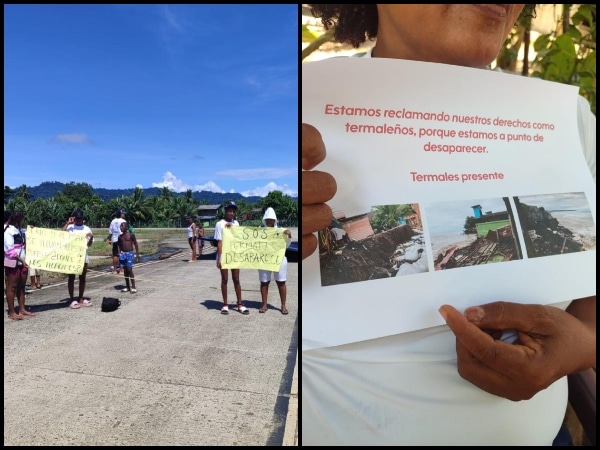These two tourist sites of great importance for the Colombian Pacific are about to disappear.
News Colombia.
Colombia’s Pacific coast is on the brink of an environmental and humanitarian catastrophe. Two of its most iconic tourist destinations, Juanchaco in Buenaventura and Los Termales in Nuquí, Chocó, are fighting for their survival in the face of the unstoppable advance of coastal erosion, which has already left more than 3,000 people affected and threatens to wipe these communities off the map.
Juanchaco and a desperate SOS from Buenaventura
In Juanchaco, the situation is critical. More than 3,000 people, including residents and business owners in the tourism sector, see their homes and businesses at risk of disappearing. The beaches, which once attracted thousands of tourists, are now disappearing, taking with them the community’s main source of income.
Residents have launched a desperate cry for help from the National Government, begging for an intervention that has so far been insufficient.
Read also:
Erosion is not only destroying tourism infrastructure, but also destroying the hope of thousands of families who depend on tourism for their livelihood.
“We are one step away from losing everything,” warn community leaders, who have seen how the lack of concrete actions by local and national authorities worsens the situation day after day.
#ValleNews | Tourism and lives at risk: Juanchaco, Ladrilleros and La Barra, abandoned in the face of the growing threat of coastal erosion. There are 3,000 people affected and they demand urgent solutions. pic.twitter.com/xfPxy9NAgU
— TUBARCO (@tubarconews) August 23, 2024
The Hot Springs in Nuquí: a paradise in danger
In Nuquí, the community of Los Termales faces a similar struggle. For months, residents have raised their voices in protest, blocking the local airport runway in a desperate measure to draw attention to the devastation coastal erosion is causing.
The overflow of a river bed has accelerated the loss of vital infrastructure: several houses, bars, tourist cabins, the surf club, the court, the connectivity point and a significant part of the beach have already been destroyed.
At this moment the community of Nuquí is protesting on the airport runway against the coastal erosion that is taking away the important tourist district of #Hot Springs
The community has been fighting for months against a river overflow that has already taken away several… pic.twitter.com/lcQWJp9uZs— Nubia Carolina Córdoba-Curi (@NubiaCarolinaCC) August 26, 2024
Although the Chocó Governorate and the mayor’s office have intervened with machinery and emergency brigades, the magnitude of the destruction far exceeds the efforts made so far.
The whale season, which traditionally brings an economic boom to the region, has been severely affected. The protests have caused disruption to air operations, a critical factor for tourism in this remote area.
As a result, the community sees no other way out than to continue to push forward, hoping that the national government will finally take the necessary measures to save their home.
Governor, here in Nuqui they urgently require your presence. The protesters say that if you come to talk, they will unblock the airport. They need a voice for a solution. @GobChoco @gusgomez1701 @CaracolRadio @lafm @darcyquinnr @NoticiasCaracol @NoticiasRCN pic.twitter.com/FYw1ya7EA5
— Jimmy (@SanzJimmy27) August 27, 2024
An uncertain future
Coastal erosion is a relentless phenomenon, and the consequences are devastating. The lack of an adequate response by the authorities not only endangers infrastructure and the local economy, but also threatens to wipe out entire communities.
This situation is an urgent reminder of the need for climate change mitigation and adaptation plans, especially in regions as vulnerable as the Colombian Pacific coast.
See: Heroic rescue: Fishermen teamed up to help a whale that was tangled in a net
The calls for help from Juanchaco and Los Termales can no longer be ignored. The survival of these towns depends on immediate and effective actions to stop the advance of erosion and ensure a future for their inhabitants.
Since May 20, the community of Termales has had to watch as coastal erosion takes away their businesses and homes, despite their attempts to survive. This scourge threatens to take away what they know as home and in view of that, they decided to protest 🧶 pic.twitter.com/8AgP4CW9s1
— Relative Coco (@Cocodreams6) August 28, 2024
Related news:

















